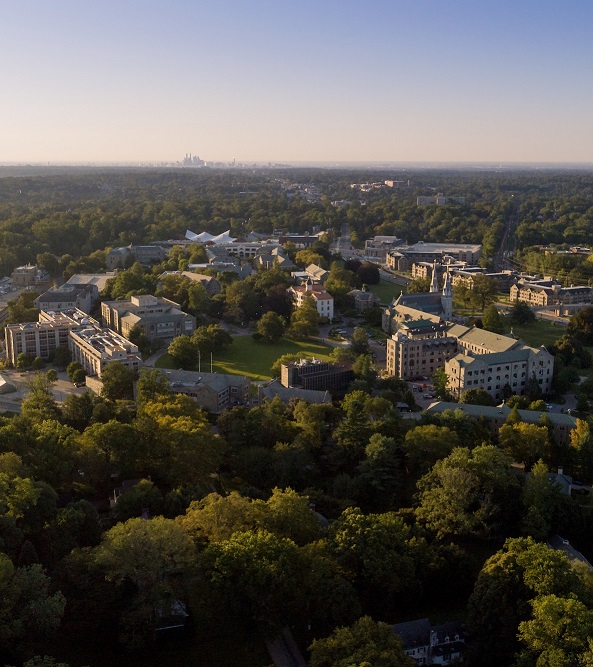Students Pen Petition for Renewable Energy on Campus
© Villanova University/Bowstring Studio
Sophomore Michelle Moczulski and Patrick Carney started a petition to get the University to transition to 100% renewable energy.
January 31, 2022
Three months ago, sophomore Environmental Science major Michelle Moczulski, along with Patrick Carney, started a petition to get the University to transition to 100% renewable energy. Both are co-chairs of the Student Sustainability Committee, and they work with the University’s Sustainability Manager, Liesel Schwarz.
The Student Sustainability Committee is organized into four groups that all handle different aspects of sustainability at the University, which are food, waste, water and energy and outreach. Moczulski is a part of the food group, and some of the initiatives it has undertaken include meeting with dining services to promote more vegetarian and vegan options, buying from local sources and engaging in composting.
For Moczulski, her passion for sustainability was cultivated in high school where she learned a lot about the perils of climate change and the natural world. She noted being devastated by what she had learned, and she later researched ways that she could be more eco-friendly and sustainable in her personal life, leading her to make changes such as becoming vegan.
Though the University is currently operating with 50% renewable energy, Moczulski notes that there are many schools across the nation that are operating at 100%. Specifically, she mentioned Bryn Mawr College and Georgetown University, both of which are potential competition for our school, with one being right next door.
“It’s not anything out of reach,” Moczulski said. “We already get 50%, so why not get the 100%?” asks Moczulski. “Villanova’s slogan is ‘Ignite Change,’ and taking this step would be igniting change. We all know that climate change is a very important problem, and if not addressed, it will have significant consequences.”
Moczulski also talked about how sustainability efforts were attractive to her when she was looking at colleges to attend. Taking steps to move to 100% renewable energy and increase those efforts can help make the University more appealing to prospective students and their families, especially if they were advertised in the tours given by Blue Key Society.
“Taking this step can be so powerful, and it could attract people to the school,” Moczulski said. “It might not be a deciding factor, but it’s the little things that make it count.”
Though the University has made improvements in sustainability, there are still places where it falls short. Given that it is a Catholic university, and that Pope Francis has recognized climate change as the impending crisis and threat that it is, the University has a responsibility to uphold those values.
“Villanova has investments in fossil fuel companies, “ Moczulski said. “Another step they should take is to divest from that. It’s terrible, they’re giving money to people that are polluting the earth. Renewable energy is on the rise, so it’s worth investing in.”
Moczulski added that in addition to administrative or institutional change, individual community members can make changes to their own lives to live more sustainably.
“We think that climate change is corporation fault or industry fault, and it is, but there are a lot of things individuals can do,” Moczulski said. “Change one thing in your life that can make you more sustainable, like bringing your own bag to the store. It’s easy, and it doesn’t take a lot of money.”
Other actions that students can take to be more eco-friendly on campus are buying the reusable utensil kits found in the convenience stores, trying to eat less meat and, most importantly, signing and sharing the petition to urge the University to move to 100% renewable energy, which can be found at this link: https://www.change.org/p/villanova-university-100-renewable-energy-for-villanova-university.
Moczulski also encouraged all Villanovans to sign up for the monthly sustainability newsletter, which provides a variety of information to students regarding sustainability events on campus, jobs and internships and opportunities to volunteer at the garden. Examples of events put on by the Student Sustainability Committee include the Wildcat Thrift, climate anxiety listening circles and events for Earth Week. One can find the link to sign up for the newsletter here: https://forms.office.com/Pages/ResponsePage.aspx?id=5Y1adpTP8EScr65b-M-jZtHOOGkFF9lKtNe4OVhyMmFUREcxRDQ5RjhLOUNMTjVRS0VEWk42SEk0Ry4u.
Ultimately, the issues of climate change and sustainable practices on campus are ones that are pressing and have implications that Moczulski demonstrated cannot be ignored.
“The students here are the future, since climate change is going to be impacting our generation and the ones after us the most,” Moczulski said. “It’s [the University’s] responsibility as role models and educators to show us that they care about our future, not only professionally and academically, but also to live the best life we can, without having to do things like move from the coast to a landlocked area because our home will be flooded.”
For more information on sustainability at Villanova, visit https://www1.villanova.edu/villanova/sustainability.html.











